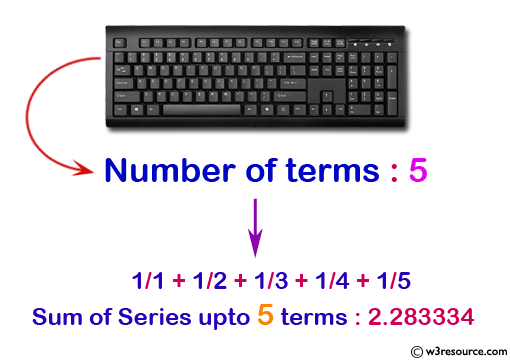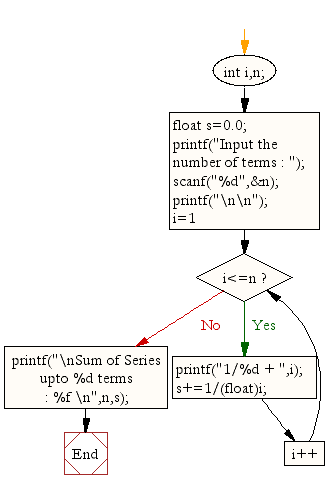C Exercises: Calculate the harmonic series and their sum
C For Loop: Exercise-19 with Solution
Write a program in C to display the n terms of harmonic series and their sum. The series is :
1 + 1/2 + 1/3 + 1/4 + 1/5 ... 1/n terms
Pictorial Presentation:

Sample Solution:
C Code:
#include <stdio.h>
void main()
{
int i,n;
float s=0.0;
printf("Input the number of terms : ");
scanf("%d",&n);
printf("\n\n");
for(i=1;i<=n;i++)
{
if(i<n)
{
printf("1/%d + ",i);
s+=1/(float)i;
}
if(i==n)
{
printf("1/%d ",i);
s+=1/(float)i;
}
}
printf("\nSum of Series upto %d terms : %f \n",n,s);
}
Sample Output:
Input the number of terms : 5
1/1 + 1/2 + 1/3 + 1/4 + 1/5
Sum of Series upto 5 terms : 2.283334
Flowchart:

C Programming Code Editor:
Improve this sample solution and post your code through Disqus.
Previous: Write a program in C to find the sum of the series [ 1-X^2/2!+X^4/4!- .........].
Next: Write a program in C to display the pattern like a pyramid using asterisk and each row contain an odd number of asterisks.
What is the difficulty level of this exercise?
Test your Programming skills with w3resource's quiz.
C Programming: Tips of the Day
Static variable inside of a function in C
The scope of variable is where the variable name can be seen. Here, x is visible only inside function foo().
The lifetime of a variable is the period over which it exists. If x were defined without the keyword static, the lifetime would be from the entry into foo() to the return from foo(); so it would be re-initialized to 5 on every call.
The keyword static acts to extend the lifetime of a variable to the lifetime of the programme; e.g. initialization occurs once and once only and then the variable retains its value - whatever it has come to be - over all future calls to foo().
Ref : https://bit.ly/3fOq7XP
- New Content published on w3resource:
- HTML-CSS Practical: Exercises, Practice, Solution
- Java Regular Expression: Exercises, Practice, Solution
- Scala Programming Exercises, Practice, Solution
- Python Itertools exercises
- Python Numpy exercises
- Python GeoPy Package exercises
- Python Pandas exercises
- Python nltk exercises
- Python BeautifulSoup exercises
- Form Template
- Composer - PHP Package Manager
- PHPUnit - PHP Testing
- Laravel - PHP Framework
- Angular - JavaScript Framework
- Vue - JavaScript Framework
- Jest - JavaScript Testing Framework
